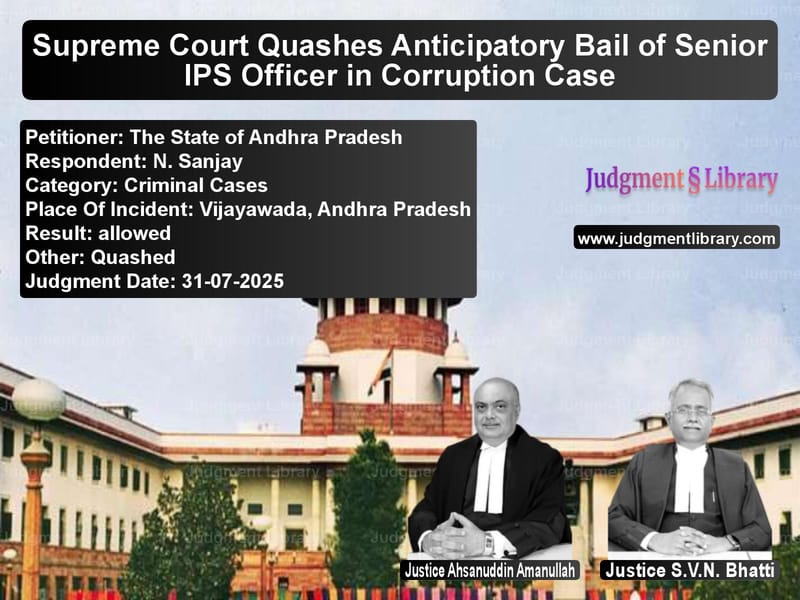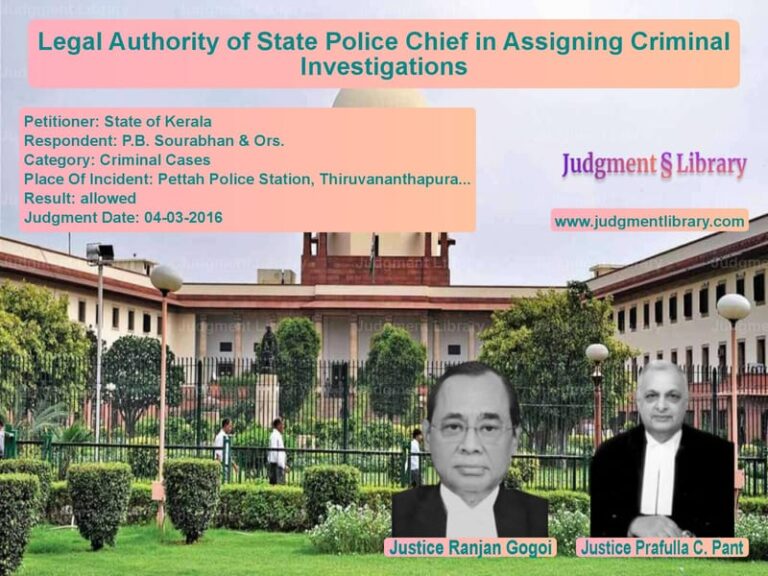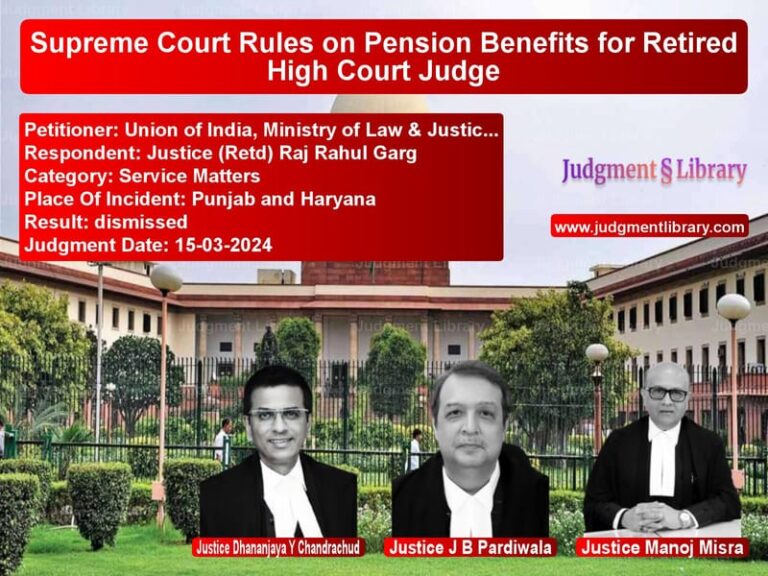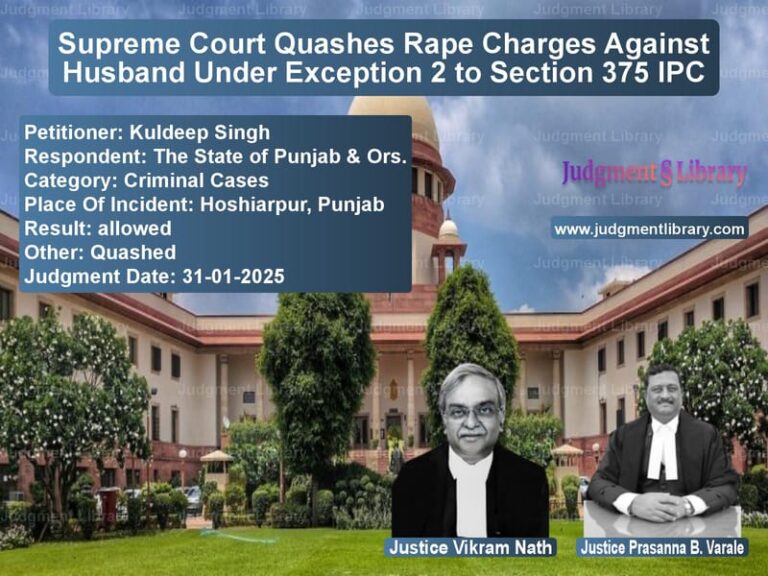Supreme Court Quashes Anticipatory Bail of Senior IPS Officer in Corruption Case
In a significant development that underscores the principle that no one is above the law, the Supreme Court of India has delivered a crucial judgment concerning anticipatory bail for a senior police officer facing serious corruption allegations. The case involved N. Sanjay, an Additional Director General of Police in Andhra Pradesh, who had been granted anticipatory bail by the High Court in a case involving alleged misappropriation of public funds through manipulated tenders and improper approvals.
The Supreme Court, after hearing detailed arguments from both sides, took a firm stance on the legal principles governing anticipatory bail, particularly in cases involving public officials and serious economic offences. The bench comprising Justice Ahsanuddin Amanullah and Justice S.V.N. Bhatti emphasized that the grant of anticipatory bail requires careful consideration of multiple factors beyond just the need for custodial interrogation.
The Allegations Against the Senior Officer
The case centered around two primary allegations against the IPS officer. First, concerning the manipulation of tenders for the Development and Maintenance of AGNI-NOC Web Portal, Mobile App and supply of hardware in violation of prescribed procedures. Second, and more significantly, regarding an Agreement signed with a private contractor for holding awareness camps for Scheduled Caste and Scheduled Tribe community members on the SC/ST (Prevention of Atrocities) Act, 1989.
The State, represented by Additional Solicitor General S.V. Raju and Senior Counsel Sidharth Luthra, presented compelling arguments about the suspicious nature of these transactions. They highlighted that the Agreement for awareness camps was signed on January 30, 2024, and on the very same day, bills and invoices presented by the contractor were approved for the entire amount without any verification of work done.
Mr. S.V. Raju, learned Additional Solicitor General submitted that “under such circumstances, where payments were approved and permitted to be drawn without any verification/confirmation with regard to the actual execution of work, serious doubts are raised concerning the genuineness of the transaction and the bona fides of the persons involved.”
The State further revealed that investigations showed that out of 25 workshops purportedly conducted, 24 were held in Government premises without rent, and the one held in private premises had the owner stating that no rent was charged or received. Even the persons conducting these workshops were departmental staff, and refreshments were arranged departmentally, raising serious questions about the legitimacy of the payments.
The State’s Arguments for Custodial Interrogation
The State presented a detailed case arguing why custodial interrogation was necessary in this matter. They emphasized that the respondent, being the highest official at whose level all official file processing stops, must be held accountable for his conduct.
Learned ASG submitted that “unless the respondent is subjected to custodial interrogation, his acts of omissions or commissions could not be established.”
Another crucial point raised by the State concerned the waiver of bank guarantee requirements. Though only 5% of the contract value (approximately Rs. 2,97,000) was required to be furnished as Bank Guarantee, on the very same day, an application for waiver of this requirement was moved and granted without any justification.
The State also challenged the High Court’s approach in passing a lengthy and detailed order while granting anticipatory bail, arguing that definite findings given on various aspects would ultimately prejudice both the Investigating Agency and the Court before which the trial might eventually proceed.
The Defense’s Counter-Arguments
Representing the IPS officer, Senior Counsel Kapil Sibal presented a robust defense, arguing that the officer’s role as the top-most official was limited to taking decisions based on material placed before him, and he was not supposed to verify each and every aspect personally.
Mr. Kapil Sibal, learned Senior Counsel for the respondent submitted that “the respondent’s role, due to him being the top-most official, was limited to taking a decision based on the material placed before him on file, and the respondent was not supposed to actually verify each and every aspect of the proposal(s) placed before him.”
The defense strongly contended that the officer was being targeted due to political vendetta following a change in government. They argued that the respondent was presently under suspension and was being targeted because of the position he held during the previous regime after the change of Government, and there is a clear-cut bias against him.
Learned Senior Counsel further submitted that “the respondent has always expressed his willingness to cooperate in the investigation, and there is no allegation that he has been called upon yet refused to cooperate. Thus, it was canvassed that custodial interrogation is absolutely not required and not justified in the facts and circumstances.”
Regarding the High Court’s detailed order, the defense argued that it was in public interest for the learned Single Judge to disclose reasons, enabling the aggrieved party to decide whether to avail remedies available under the Constitution or law.
The High Court’s Reasoning and Supreme Court’s Analysis
The High Court, in granting anticipatory bail, had made several significant observations that became central to the Supreme Court’s analysis. The High Court had stated that “Merely because there are certain procedural violations, the petitioner cannot be made liable therefor… Merely because the amounts have been released in favour of companies for the works completed by them, it would not come within the purview of the offence punishable under Section 409 IPC.”
Furthermore, the High Court had observed that “The Head of the Institution, being the Supervisory Authority, would not in any way go into each and every aspect in detail in order to release funds in favour of the companies.” The High Court also considered the officer’s medical condition, noting that he was a cardiac patient who had undergone coronary artery bypass graft surgery.
The Supreme Court, however, took a different view of the legal principles involved. The Court referred to its earlier judgment in Sumitha Pradeep v Arun Kumar C K, (2022) 17 SCC 391 where it was held: “There appears to be a serious misconception of law that if no case for custodial interrogation is made out by the prosecution, then that alone would be a good ground to grant anticipatory bail. Custodial interrogation can be one of the relevant aspects to be considered along with other grounds while deciding an application seeking anticipatory bail.”
The Court further emphasized that “The first and foremost thing that the court hearing an anticipatory bail application should consider is the prima facie case put up against the accused. Thereafter, the nature of the offence should be looked into along with the severity of the punishment.”
Referring to P Krishna Mohan Reddy v State of Andhra Pradesh, 2025 SCC OnLine SC 1157, the Court noted: “it would be preposterous as a proposition of law to say that if custodial interrogation is not required that by itself is sufficient to grant anticipatory bail. Even in cases where custodial interrogation may not be required the court is obliged to consider the entire case put up by the State, more particularly, the nature of the offence, the punishment provided in law for such offence etc.”
The Supreme Court’s Final Decision
After careful consideration of all aspects, the Supreme Court concluded that the facts and allegations were not such which would enable the grant of anticipatory bail to the respondent as had been done by the High Court. The Court allowed the State’s appeal and set aside the anticipatory bail granted to the IPS officer.
The Court observed that “on an overall conspectus and in the fitness of things, while refraining from making detailed observations, lest the same prejudice either side, at this prima facie stage, the Court is ad idem with the learned ASG that the facts and allegations are not such which would enable the grant of anticipatory bail to the respondent as has been done by the High Court.”
However, showing consideration for the officer’s circumstances, the Court granted him four weeks to surrender before the concerned court and apply for regular bail. The Court clarified that “in the event the respondent surrenders before the Court concerned within four weeks from today and prays for bail, the same shall be considered on its own merits and in accordance with law, without being prejudiced by observations, if any, in the present Order.”
The Court also kept open the prosecution’s right to seek custody for interrogation, stating that “it shall also be open for the prosecution to pray for custody for interrogation of the respondent before the Trial Court.” Importantly, given the officer’s medical condition, the Court directed that “if the respondent be in custody, due and appropriate care will be accorded to him by the State, regard being had to his medical condition.”
Broader Implications of the Judgment
This judgment reinforces several important legal principles concerning anticipatory bail, particularly in cases involving public officials and serious economic offences. The Supreme Court has clearly established that the absence of need for custodial interrogation alone cannot be grounds for granting anticipatory bail. Courts must consider the prima facie case, nature of offence, severity of punishment, and overall circumstances.
The decision also underscores the principle of equality before law, with the Court observing that “the larger issue that comes to the fore is whether any person, no matter how high the office he holds, is to be treated on an equal footing by law, like a common citizen.”
Furthermore, the judgment serves as a reminder to investigating agencies to act in a non-partisan manner, focusing on actual merits of cases based on proper factual aspects and records. The Court directed that “the Investigating Agency should act in a non-partisan manner, focusing on the actual merits of the case based on proper factual aspects and records, and conclude the investigation at the earliest.”
This ruling is likely to have significant implications for how courts across the country approach anticipatory bail applications in corruption cases, particularly those involving senior public officials. It reaffirms the judiciary’s commitment to ensuring that legal protections like anticipatory bail are not misused to shield those accused of serious economic crimes that affect public welfare and trust in governance.
Petitioner Name: The State of Andhra Pradesh.Respondent Name: N. Sanjay.Judgment By: Justice Ahsanuddin Amanullah, Justice S.V.N. Bhatti.Place Of Incident: Vijayawada, Andhra Pradesh.Judgment Date: 31-07-2025.Result: allowed.
Don’t miss out on the full details! Download the complete judgment in PDF format below and gain valuable insights instantly!
Download Judgment: the-state-of-andhra-vs-n.-sanjay-supreme-court-of-india-judgment-dated-31-07-2025.pdf
Directly Download Judgment: Directly download this Judgment
See all petitions in Bail and Anticipatory Bail
See all petitions in Fraud and Forgery
See all petitions in Public Sector Employees
See all petitions in Judgment by Ahsanuddin Amanullah
See all petitions in Judgment by S.V.N. Bhatti
See all petitions in allowed
See all petitions in Quashed
See all petitions in supreme court of India judgments July 2025
See all petitions in 2025 judgments
See all posts in Criminal Cases Category
See all allowed petitions in Criminal Cases Category
See all Dismissed petitions in Criminal Cases Category
See all partially allowed petitions in Criminal Cases Category







